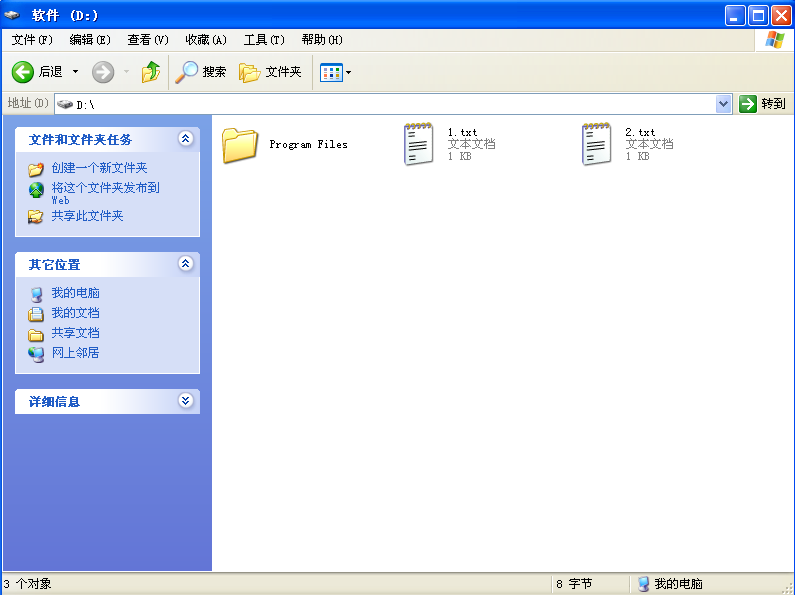文件上传1.上传单个文件2.上传多个文件1.上传单个文件实现步骤:(1)导入一个Jar包:commons-io-1.3.2.jar。只所以要导入这个Jar包,是因为要用到一个工具类FileUtil。若不使用此工具类,就无需导入此包了。(2)把form表单的enctype设置为:“multipart/form-data”,method设置为“post”,否则此表单不能用于上传。如下:<form enctype="multipart/form-data" action="xxx.action" method="post"> <input type="file" name="uf"> </form>(3)在Action类中添加以下属性private File uf;//上传的文件 private String ufFileName;//文件名称注意:蓝色部分对应于表单中文件字段的名称。而FileName是必须的。最后是,在Action方法中实现对上传文件的操作。2.上传多个文件
与上传单个文件相比,发生了如下几个变化:
(1)提交表单中出现多个文件上传栏,这多个的name属性名必须完全相同。
(2)Action中文件不再为File类型了,而是File类型的数组或List。当然,文件名也为相应的数组或List了。
(3)Action方法需遍历这些数组来上传这些文件。
下面例子都已导入struts2核心jar包基础上,又导入了commons-io-1.3.2.jar包。
实例1:上传单个文件—fileupload
代码文档目录如下:
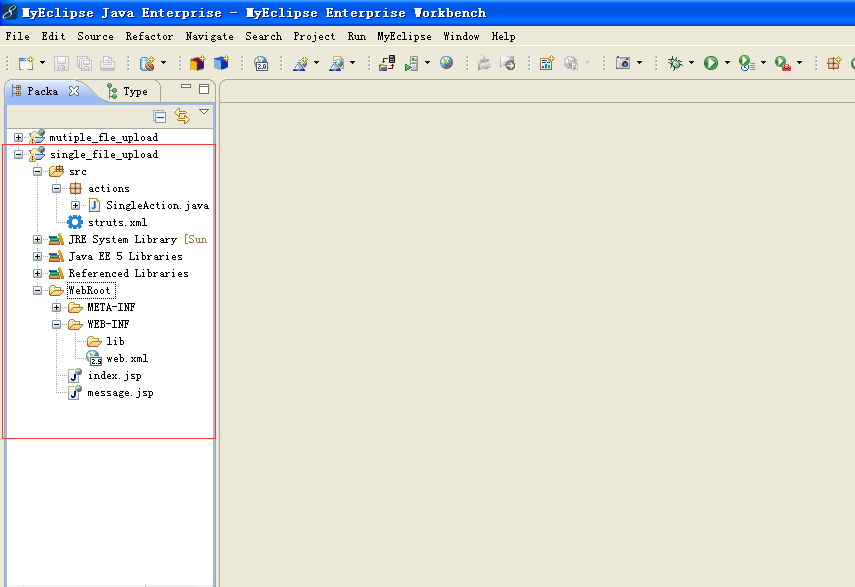
Step1:编写index.jsp页面
<%@ page pageEncoding="utf-8"%> <html> <head> <title>upload page</title> </head> <body> <form action="single.action" enctype="multipart/form-data" method="post"> 文件<input type="file" name="uf"/><br/> <input type="submit" value="上传"/> </form> </body> </html>
Step2:编写SingleFileUploadAction.java
package actions; import java.io.File; import java.io.IOException; import org.apache.commons.io.FileUtils; import com.opensymphony.xwork2.ActionContext; public class SingleAction { private File uf; private String ufFileName; public File getUf() { return uf; } public void setUf(File uf) { this.uf = uf; } public String getUfFileName() { return ufFileName; } public void setUfFileName(String ufFileName) { this.ufFileName = ufFileName; } public String execute(){ String savePath="D:/"; if(uf!=null) { File saveFile=new File(savePath,ufFileName); try { //将 uf 文件的内容复制到saveFile中。 FileUtils.copyFile(uf, saveFile); ActionContext.getContext().put("message","文件上传成功!"); } catch (IOException e) { e.printStackTrace(); ActionContext.getContext().put("message","文件上传失败!"); } }else{ ActionContext.getContext().put("message","没有指定要上传的文件"); } System.out.println(ufFileName); return "success"; } }
Step2:编写web.xml与struts.xml
web.xml如下:
<?xml version="1.0" encoding="UTF-8"?> <web-app version="2.5" xmlns="http://java.sun.com/xml/ns/javaee" xmlns:xsi="http://www.w3.org/2001/XMLSchema-instance" xsi:schemaLocation="http://java.sun.com/xml/ns/javaee http://java.sun.com/xml/ns/javaee/web-app_2_5.xsd"> <filter> <filter-name>struts2</filter-name> <filter-class>org.apache.struts2.dispatcher.ng.filter.StrutsPrepareAndExecuteFilter</filter-class> </filter> <filter-mapping> <filter-name>struts2</filter-name> <url-pattern>/*</url-pattern> </filter-mapping> <welcome-file-list> <welcome-file>index.jsp</welcome-file> </welcome-file-list> </web-app>
修改上传文件大小限制:默认最大2M
使用方法:
在struts.xml中添加下面这段代码:
<constant name="struts.multipart.maxSize" value="5242880"/>
struts.xml如下:
<?xml version="1.0" encoding="UTF-8" ?> <!DOCTYPE struts PUBLIC "-//Apache Software Foundation//DTD Struts Configuration 2.0//EN" "http://struts.apache.org/dtds/struts-2.0.dtd"> <struts> <constant name="struts.multipart.maxSize" value="9999242880"></constant> <package name="one" extends="struts-default"> <action name="single" class="actions.SingleAction"> <result>/message.jsp</result> </action> </package> </struts>
Step3:编写message.jsp
<%@ page pageEncoding="utf-8" isELIgnored="false"%> <html> <head> <title>message page</title> </head> <body> 提示信息:${message} </body> </html>
注意,当文件内容为空时,tomcat后台会报错。
部署发布,启动tomcat,输入地址:
http://127.0.0.1:8080/single_file_upload/


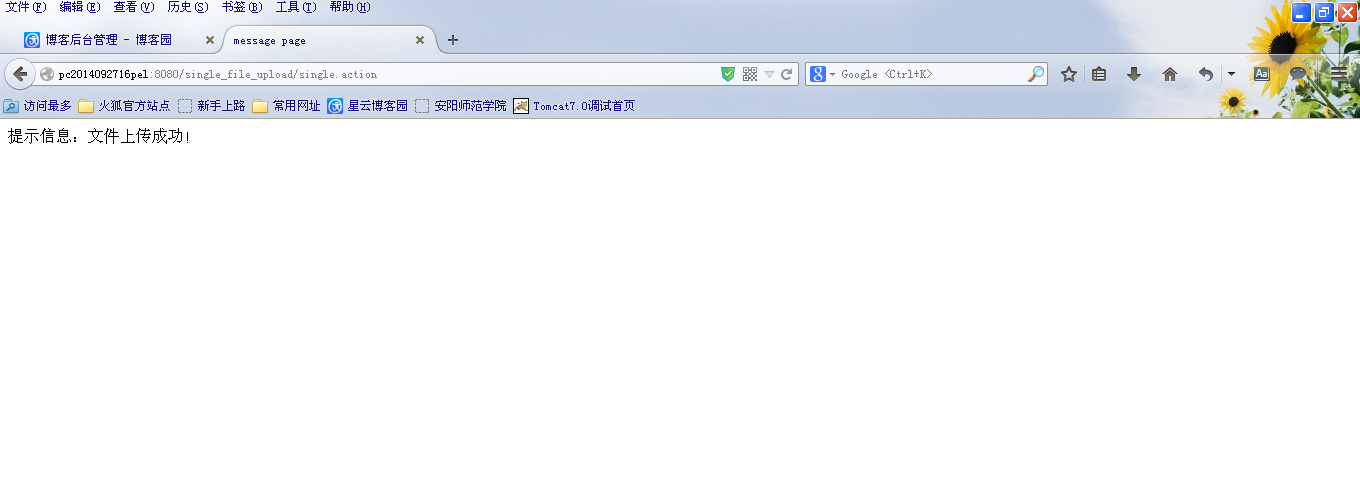
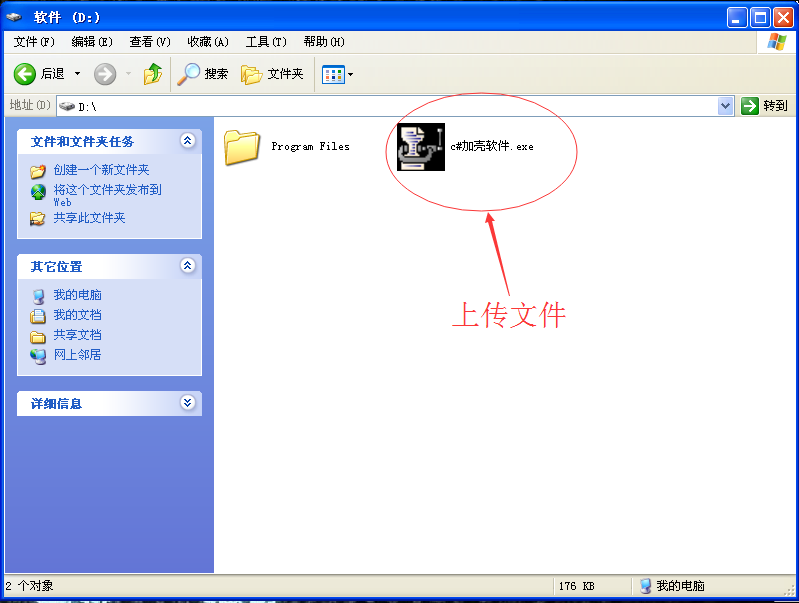
实例2:上传多个文件—fileupload
Step1:编写index.jsp页面
<%@ page pageEncoding="utf-8"%> <html> <head> <title>upload page</title> </head> <body> <form action="multiple.action" enctype="multipart/form-data" method="post"> 文件1<input type="file" name="ufs"/><br/> 文件2<input type="file" name="ufs"/><br/> 文件3<input type="file" name="ufs"/><br/> <input type="submit" value="上传"/> </form> </body> </html>
Step2:编写MultipleAction.java
package actions; import java.io.File; import java.io.IOException; import org.apache.commons.io.FileUtils; import com.opensymphony.xwork2.ActionContext; public class MultipleAction { private File[] ufs; private String[] ufsFileName; public File[] getUfs() { return ufs; } public void setUfs(File[] ufs) { this.ufs = ufs; } public String[] getUfsFileName() { return ufsFileName; } public void setUfsFileName(String[] ufsFileName) { this.ufsFileName = ufsFileName; } public String execute() { StringBuffer sb=new StringBuffer(); String savePath = "D:/"; if (ufs != null) { for (int i = 0; i < ufs.length; i++) { if (ufs[i] != null) { File saveFile = new File(savePath,ufsFileName[i]); try { FileUtils.copyFile(ufs[i], saveFile); sb.append("文件"+(i+1)+"上传成功!"); } catch (IOException e) { e.printStackTrace(); sb.append("文件"+(i+1)+"上传失败!"); } } } }else { sb.append("文件指定要上传的文件!"); } ActionContext.getContext().put("message",sb.toString()); return "success"; } }
Step2:编写web.xml与struts.xml
web.xml如下:
<?xml version="1.0" encoding="UTF-8"?> <web-app version="2.5" xmlns="http://java.sun.com/xml/ns/javaee" xmlns:xsi="http://www.w3.org/2001/XMLSchema-instance" xsi:schemaLocation="http://java.sun.com/xml/ns/javaee http://java.sun.com/xml/ns/javaee/web-app_2_5.xsd"> <filter> <filter-name>struts2</filter-name> <filter-class>org.apache.struts2.dispatcher.ng.filter.StrutsPrepareAndExecuteFilter</filter-class> </filter> <filter-mapping> <filter-name>struts2</filter-name> <url-pattern>/*</url-pattern> </filter-mapping> <welcome-file-list> <welcome-file>index.jsp</welcome-file> </welcome-file-list> </web-app>
struts.xml如下:
<?xml version="1.0" encoding="UTF-8" ?> <!DOCTYPE struts PUBLIC "-//Apache Software Foundation//DTD Struts Configuration 2.0//EN" "http://struts.apache.org/dtds/struts-2.0.dtd"> <struts> <package name="one" extends="struts-default"> <action name="multiple" class="actions.MultipleAction"> <result>/message.jsp</result> </action> </package> </struts>
Step3:编写message.jsp
<%@ page pageEncoding="utf-8" isELIgnored="false"%> <html> <head> <title>message page</title> </head> <body> 提示信息:${message} </body> </html>
部署发布,启动tomcat,输入地址:
http://127.0.0.1:8080/mutiple_fle_upload/
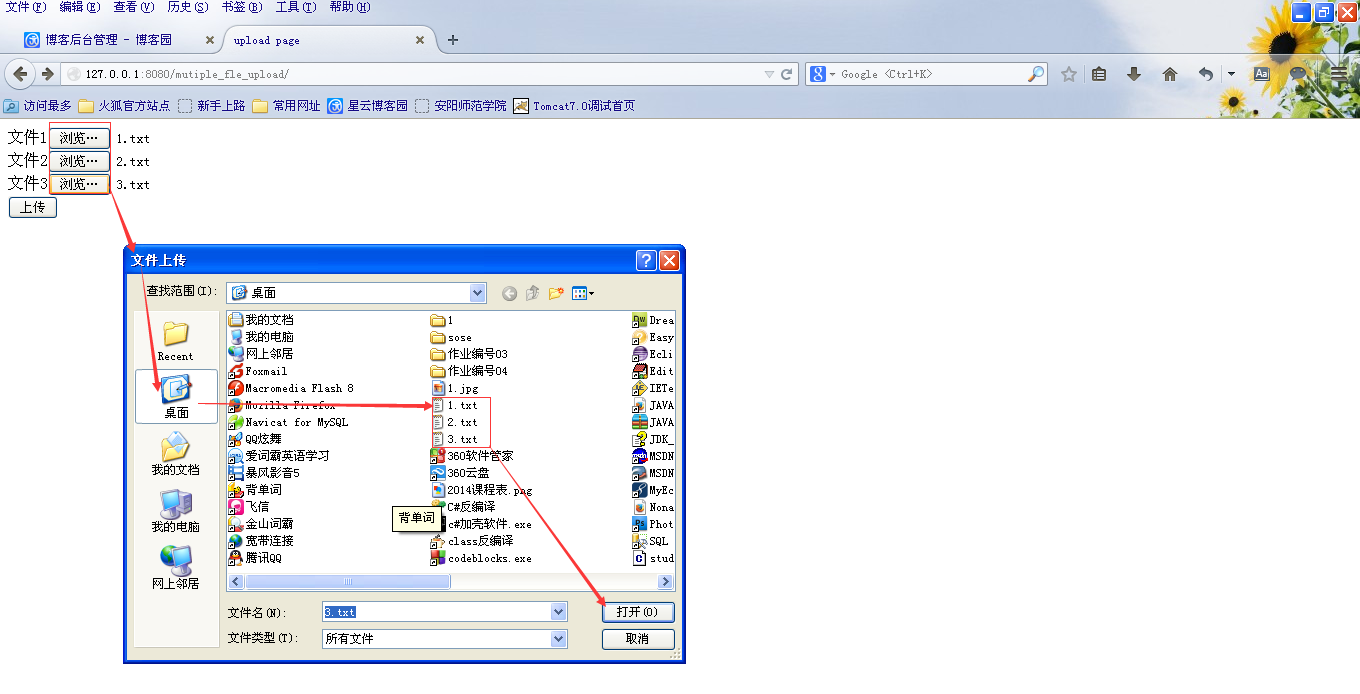

注意:1.txt有内容,2.txt有内容,3.txt内容为空。

